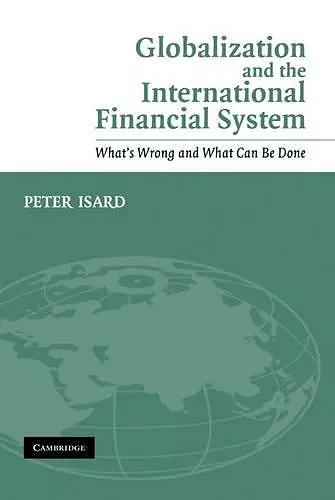Globalization and the International Financial System
What's Wrong and What Can Be Done
Format:Hardback
Publisher:Cambridge University Press
Published:20th Dec '04
Currently unavailable, and unfortunately no date known when it will be back
This hardback is available in another edition too:
- Paperback£32.00(9780521605076)

This book discusses the problematic side of the international financial system.
Provides perspectives on various aspects of the international financial system that contribute to financial crises and growth failures, and discusses the remedies that economists have proposed. It also sheds light on a central feature of the international financial system: the activities and effectiveness of the International Monetary Fund.Economic globalization has given rise to frequent and severe financial crises in emerging market economies. Other countries are also unsuccessful in their efforts to generate economic growth and reduce poverty. This book provides perspectives on various aspects of the international financial system that contribute to financial crises and growth failures, and discusses the remedies that economists have proposed for addressing the underlying problems. It also sheds light on a central feature of the international financial system that remains mysterious to many economists and most non-economists: the activities of the International Monetary Fund and the factors that influence its effectiveness. Dr Isard offers policy perspectives on what countries can do to reduce their vulnerabilities to financial crises and growth failures, and a number of general directions for systemic reform. The breadth of the agenda provides grounds for optimism that the international financial system can be strengthened considerably without revolutionary change.
'Peter Isard brings deep scholarship and experience to the bewildering array of problems surrounding the brave new world of globalized international finance. No single volume I know does a better job of evaluating the current international financial system and its history, and drawing sensible implications for national and global policy. This book will be required reading for every serious student of the world economy.' Maurice Obstfeld, University of California, Berkeley
'A masterful survey of what ails the international financial system and how to fix it. Peter Isard writes with clarity, objectivity, and good sense. Anyone interested in the ongoing debate on globalization - and in particular, on the changing role of the IMF in the system - will find this book worthwhile reading.' Morris Goldstein, Institute for International Economics, Washington, DC
'Peter Isard provides a thoughtful and thorough review of the accomplishments and challenges of the international financial system and its principal multilateral institution - the International Monetary Fund - in an era of inevitable, rapid globalization. He blends crisp analysis with deep institutional knowledge to produce an insightful and valuable tour de force.' Edwin M. Truman, Institute for International Economics
'This book is a wonderful blend of economic analysis and front line experience with the mysterious world of international finance A serious read, it takes on two great problems of our times, recurrent financial crises and the failure of financial and economic development and sets out what we do and do not know about these problems. The IMF is a prominent player in this game and Isard provides an even handed and thorough explanation of what it does and why. Globalization is much maligned but little understood. This book provides a concise and accessible path to understanding.' Michael Dooley, University of California, Santa Cruz
'… it is important … there is a general sense that the international financial architecture needs serious reform … Secondly, how do we deal with sovereign financial distress without running up against 'nationalist resistance' as well as extra-economic issues such as national security and political governance? Thirdly, given the global nature of the desired reforms, how will the new financial architecture deal with issues of accountability and representation, as whatever shape the reform takes has crucial implications for many people? Isard's thesis could be summarised thus: globalisation, and in particular economic globalisation, has speeded up large international capital flows with greater possibilities for financial crisis, to which the international system is prone because a host of things are wrong with the way the current international financial architecture is shaped … Globalisation and its consequences, not just for the financial system, but also for areas such as energy, the environment, migration, public health, etc. will be issues for debate for some time to come and rightly so. In that context, Isard's contribution is a useful and recommended addition.' Development Policy Review
ISBN: 9780521843898
Dimensions: 237mm x 158mm x 28mm
Weight: 630g
388 pages